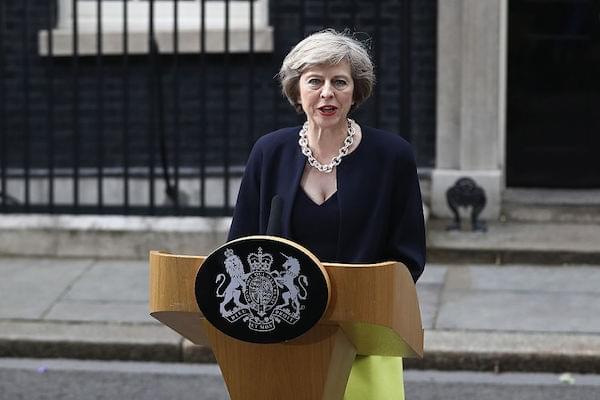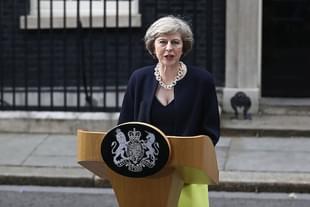World
What May’s Defeat Means For The Future Of Britain
David A. Cowan
Jun 14, 2017, 12:16 PM | Updated 12:16 PM IST
Save & read from anywhere!
Bookmark stories for easy access on any device or the Swarajya app.


British Prime Minister Theresa May now stands alone. Her majority has been lost, her two closest advisors have resigned, and her authority has evaporated. This was not supposed to happen. May called a snap election to become a transformative Prime Minister with a landslide majority. Instead, she is in office but not in power. It is proof of how British politics continues to be extremely volatile in the age of Brexit.
When this election began, many were predicting an electoral realignment. It has certainly done that but in unexpected ways. The collapse of the UK Independence Party has marked a return to two-party politics. Many expected this would allow the Conservative Party to make a breakthrough in pro-Brexit, working-class communities in England and Wales. The Conservatives certainly benefited from the UKIP collapse as their vote share rose to 42.4 per cent, an increase of 5.5 per cent since the 2015 general election. But many UKIP voters in the North and the Midlands defied expectations and returned to Labour.
It was an incredible surge in Labour’s support, up by 9.5 per cent from their 2015 result, which stopped May from winning a majority. Despite his multiculturalist ideology and sordid links with the IRA, Jeremy Corbyn managed to neutralise the issue of Brexit. Instead of resisting the Brexit result, Corbyn went against the wishes of Labour moderates and pledged the party to leaving the European single market and restoring controls on immigration. This has proven to be an ingenious decision. Corbyn effectively made himself an acceptable anti-establishment candidate for UKIP supporters in Labour’s heartlands.
The End of Austerity
Brexit was the reason given for calling this snap election, but it did not define the election campaign. The electorate wanted to talk about domestic issues, especially public services. Seven years of austerity economics have taken the blame for recent problems. A few months ago the National Health Service experienced its worst winter crisis since 2004, and the three recent terror attacks came after years of cuts to police numbers during May’s tenure as Home Secretary. The Conservatives failed to launch any convincing counter-attack.
In a controversial manifesto, May outlined a communitarian conservative philosophy but without popular policies to back it up. It also proposed policies that alienated voters aged over-65, a key base of support for Conservatives who helped deliver a majority for David Cameron in 2015. Labour labelled May's social care policy, dubbed as a “dementia tax” by the press, and cuts to the winter fuel allowance and the state pension as a “triple whammy” for the elderly. After a poorly executed U-turn on the “dementia tax,” May led a robotic and negative campaign focused on Corbyn and lacking positive reasons for voters to trust the Conservatives with the economy and public services.
This gave Labour the initiative to lead a campaign focused on intergenerational anger with austerity economics. Labour’s manifesto promised an innumerate and long list of giveaways funded by taxes on the rich and borrowing. The most popular Labour policy was the promise to scrap university tuition fees and cancel all student debt. Corbyn’s appeal to the young helped deliver a remarkably high turnout of 66.4 per cent among 18-to-24-year olds, as well as draining support from centre-left third parties such as the Greens and Liberal Democrats. With enthusiasm from the young and disillusion from the elderly, Labour made major inroads in Conservative strongholds across Southern England and London.
Victory for the Union
Although the Conservatives had a devastating night in England and Wales, there was plenty of good news for unionists in Scotland and Northern Ireland. In last year’s European Union (EU) referendum, Scotland and Northern Ireland voted decisively in favour of remaining in the EU. Remain-ers argued that leaving the EU would lead to the disintegration of the United Kingdom. Quite the reverse has happened.
The Scottish National Party (SNP), which has run the devolved government for the past decade, lost 21 seats to unionist parties, including the Scottish Conservatives who won a total of 13 seats after previously holding just one seat. It was the Scottish Conservatives’ best result since 1983. This big win made it possible for the Conservatives to still be the largest party and killed the SNP’s ambition to hold a second referendum on Scottish independence.
An equally dramatic story unfolded in Northern Ireland. The province is now divided between 10 seats held by the hard-line Democratic Unionist Party (DUP), one pro-union independent, and seven seats held by the far-left nationalist Sinn Fein, with no seats held by the centrist parties. It is this stunning victory for the DUP which has allowed May to cut a deal with them to secure a working majority in the House of Commons.
What Next for Brexit?
May has now become a caretaker Prime Minister. She will serve so long as it is convenient for the Conservative Party, and run the government in a more collegial manner. The party wants to regroup and take stock before holding a leadership election later this summer. For now, May will start the Brexit negotiations on June 19 as originally planned.
The two most likely contenders for the Conservative leadership are Boris Johnson, the foreign secretary, and David Davis, the Brexit secretary. Both were prominent Leave campaigners in last year’s referendum. Tories who campaigned for Remain will likely look for someone to stand against them as a pro-soft Brexit candidate.
With such a weak hold over Parliament, Brexit will dominate, and most probably paralyse, the Conservative government’s legislative agenda, and cause the negotiations to be a fraught and difficult experience for May and her successor. This makes another snap election, under a new leader, very likely to take place either this fall or next spring.
May-ism has also been buried by this election result. There is no May-ite power base to carry on the ideas put forward in the Conservative manifesto. Leave and Remain Tories alike will now dispense with May’s communitarian conservatism and return the party to a more liberal conservatism, either of the Thatcherite or Cameronite variety. This could lead to a more pro-business, internationalist vision for Brexit.
Brexit marked the beginning of a political realignment that is not yet complete. The divisions between metropolitan and provincial Britain, the elderly and the young, and unionists and nationalists, have transformed the electoral map.
May recognised and addressed these political fault lines but ultimately failed to translate her vision into a successful electoral message.
British politics continues to be in flux, and it remains to be seen what kind of Conservative party and what kind of Brexit will emerge.
This article was first published on The American Conservative and has been republished here with permission.
David A. Cowan is a freelance writer and conservative activist who graduated from the University of Cambridge with an M.Phil. in political thought and intellectual history.





